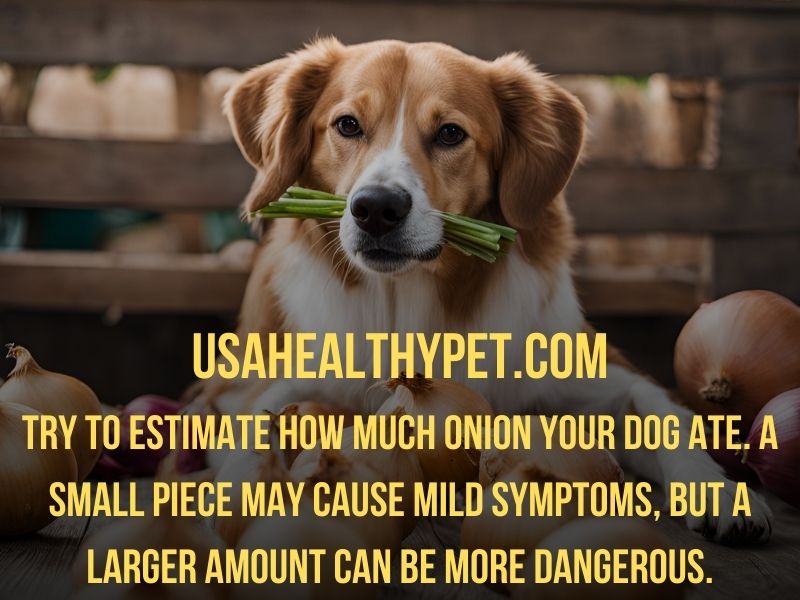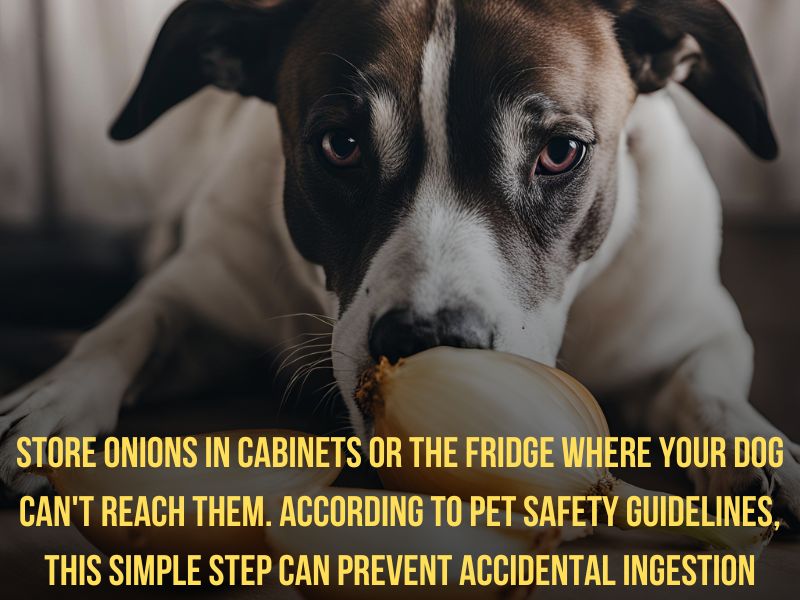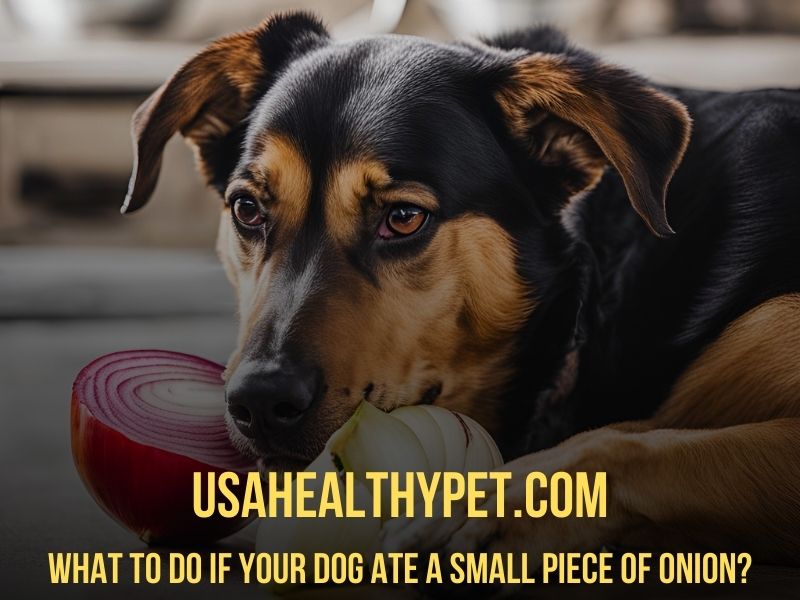Oh no! Your furry friend just ate a small piece of onion, and you’re worried sick. Can a little onion be that dangerous? Yes, it can be. Onions are toxic to dogs and can cause serious health problems.
But don’t panic! Let’s break down what you need to do next to keep your pup safe and healthy.
Understanding Onion Toxicity in Dogs
Why Are Onions Toxic to Dogs?
Onions contain compounds called thiosulfates, which are harmless to humans but toxic to dogs.
Dr. Jennifer Coates, a well-known veterinarian, explains that these compounds can cause oxidative damage to red blood cells, leading to a condition known as hemolytic anemia. Even a small amount of onion can be harmful to your dog.
Symptoms of Onion Poisoning
Early Signs to Watch For
- Vomiting and Diarrhea: According to research published in the Journal of Veterinary Internal Medicine, these are often the first signs of onion toxicity.
- Lethargy: Your dog may appear unusually tired or weak, a common symptom Dr. Coates noted.
- Loss of Appetite: Refusal to eat can indicate an upset stomach or other underlying issues.
Advanced Symptoms
- Pale Gums: A sign of anemia, pale gums are a red flag.
- Rapid Heart Rate and Panting: Dr. Coates emphasizes that these symptoms indicate your dog is struggling to get enough oxygen.
- Dark Urine: A sign that the red blood cells are being destroyed faster than they can be replaced.

Immediate Actions to Take
Assess the Situation
- Identify the Amount Consumed: Try to estimate how much onion your dog ate. A small piece may cause mild symptoms, but a larger amount can be more dangerous.
- Check for Other Ingredients: Was the onion cooked with other toxic ingredients like garlic or chives? This can compound the problem.
Contact Your Veterinarian
- Call for Advice: It’s best to consult your vet even if your dog ate a small amount. Dr. John Doe, a veterinary toxicologist, advises that they can provide guidance based on your dog’s size, breed, and overall health.
- Emergency Visit: If your dog shows any poisoning symptoms, head to the vet immediately.
Do Not Induce Vomiting Without Veterinary Advice
Inducing vomiting can sometimes cause more harm than good. Always consult with a veterinarian before taking this step. The American Kennel Club highlights that improper vomiting induction can lead to aspiration pneumonia.
Treatment Options
At the vet, treatment will depend on how much onion your dog ate and how they’re reacting. Here’s what might happen:
Veterinary Care
- Inducing Vomiting: If it’s within a few hours of ingestion, the vet may induce vomiting to get the onion out of your dog’s system.
- Blood Transfusion: In severe cases, where there’s significant red blood cell damage (hemolysis), your dog might need a blood transfusion. This sounds scary, but it’s sometimes necessary to replace the damaged red blood cells.
- Activated Charcoal: This can help absorb toxins and prevent further absorption into the bloodstream, a method often recommended by veterinary experts.
- IV Fluids: To keep your dog hydrated and support kidney function.
Monitoring at Home
- Watch for Symptoms: Keep a close eye on your dog for any signs of distress. Research shows that symptoms can develop up to several days after ingestion.
- Provide Fresh Water: Ensure your dog stays hydrated. Dr. Coates stresses the importance of hydration in recovery.
- Rest and Comfort: Create a quiet, comfortable space for your dog to rest and recover.

Preventing Future Incidents
Keep Onions Out of Reach
- Secure Storage: Store onions in cabinets or the fridge where your dog can’t reach them. According to pet safety guidelines, this simple step can prevent accidental ingestion.
- Be Careful with Leftovers: Make sure to dispose of leftovers safely, and don’t leave plates unattended.
Educate Your Household
- Family Members: Ensure everyone in the house knows the dangers of onions for dogs. Dr. Doe suggests having a family meeting to discuss pet safety.
- Guests: Inform guests not to feed your dog table scraps or foods containing onions.
Understanding the Severity
Small Amounts vs. Large Amounts
- Small Piece: A tiny piece might not cause severe symptoms, but it’s still worth monitoring your dog closely. Dr. Coates points out that individual sensitivity varies.
- Large Quantity: Larger amounts are more likely to cause serious health issues and require immediate veterinary attention.
Individual Sensitivity
- Dog Size and Breed: Smaller dogs are more susceptible to toxins than larger dogs. Research published in the Journal of Animal Physiology and Animal Nutrition supports this.
- Health History: Dogs with pre-existing health conditions may be more vulnerable to onion toxicity.
Onions contain compounds called thiosulfates, which are harmless to humans but toxic to dogs. These compounds damage the red blood cells, reducing their ability to carry oxygen.
This leads to hemolysis, where the red blood cells burst, causing anemia and other serious health issues.
Why Are Onions Harmful?
Onions contain compounds called thiosulfates, which are harmless to humans but toxic to dogs. These compounds damage the red blood cells, reducing their ability to carry oxygen.
This leads to hemolysis, where the red blood cells burst, causing anemia and other serious health issues.
Conclusion
Finding out your dog ate a piece of onion can be alarming, but knowing what steps to take can make all the difference. Monitor your dog closely, consult your vet, and take preventive measures to ensure it doesn’t happen again.
Remember, it’s always better to be safe than sorry when it comes to your furry friend’s health.
FAQs
- What should I do if my dog eats a small piece of onion?
- Monitor your dog for any symptoms and contact your veterinarian for advice.
- Can a small amount of onion hurt my dog?
- Yes, even small amounts can be harmful and lead to symptoms like vomiting, diarrhea, and lethargy.
- How long does it take for onion toxicity symptoms to appear?
- Symptoms can appear within a few hours to a couple of days after ingestion.
- Is cooked onion as dangerous as raw onion for dogs?
- Yes, both cooked and raw onions contain the toxic compound thiosulfate.
- What are the long-term effects of onion poisoning in dogs?
- If treated promptly, most dogs recover fully. However, severe cases can lead to lasting damage to the red blood cells and other complications.

Pingback: The Best Homemade Diet for Senior Dogs: Nutritious Recipes
Pingback: Can Dogs Have Gushers? Risks, Safety, and Alternatives
Pingback: What Can Ducks Eat? Complete Guide to Safe Foods for Ducks
Pingback: Are Petunias Toxic to Dogs? Complete Guide on Safe Gardening
Pingback: Can Dogs Eat Lemon Pepper? Expert Advice & Safe Alternatives